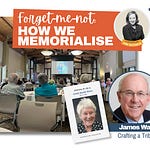Family historians and genealogists have always appreciated a well-crafted obituary. With a 45-year journalism career that spanned some of the leading publications in the world, James R. (Bob) Hagerty brings a unique perspective to the art of obituary writing. He builds on this experience in book, “Yours Truly, An Obituary Writer’s Guide to Telling Your Story,” to describe the value of writing your own stories — now.
He’s on a mission to help more people tell the stories of their lives.
He became passionate about the art of writing obituaries when he read those written for people he’d known. He was left asking the question, “Is that all?” Now, with the experience of writing more than 1,000 obituaries, he’s discovered specific techniques that can help anyone get past the facts to tell the compelling stories that bring a person’s life into focus.
Bob described three simple questions to start with…
WHAT were they trying to do?
WHY were they trying to do THAT?
HOW did that work out?
This simple idea will often peel back layers of facts to reveal fascinating stories. Though many of his biographies have covered celebrities, he shared that some of his most interesting have covered lives that might otherwise be overlooked.
In the recording, you’ll hear his mention of a 116-year-old woman he had the occasion to meet in North Dakota, Iris Westman. When she passed, he used the stories collected from their conversation to prepare a story for the Wall Street Journal that was one of his most popular, “At Age 115, She Was Content to Look Out Her Window.”1
Bob also cautioned about stories. You’re not looking for one “story of your life” but the many stories that can be strung together to create a narrative that captures your character, personality, and priorities.
Though he typically begins an obituary with a formal series of questions that move chronologically through the person’s life, he focuses on the turning points that highlight what’s important in that life. His What, Why, and How questions allow him to drill down to explore those moments. He offered that one of his favorite things to start with is, “How did you meet your partner?” Most people have practiced stories to respond with.
Finally, Bob and Jane briefly discussed the hurt feelings and drama that can result when facts get in the way of a curated narrative.
Enjoy the discussion, then join us to add your thoughts in the comments below.
About this series
“Forget-Me-Not: How We Memorialise” is a six-part series for storytellers and family historians that explores how we memorialize and preserve the stories of people who have died. The series is a collaboration between Jane Hutcheon of The Juvenile Geriatric Newsletter and Projectkin.org, a community of family historians hooked on stories.
Jane Hutcheon is a Sydney-based journalist and the creator and former host of the ABCTV interview show One Plus One from 2010 until 2019. She is also a writer and performer in theater productions sharing her perspectives in The Juvenile Geriatric on Substack. In 2022, she wrote a show about my mother’s upbringing called Lost in Shanghai, and her latest show is Difficult Conversations with Jane Hutcheon. We’re thrilled to have this Forget-Me-Not series as part of Projectkin.
More about Jane’s concept for the series. Explore our calendar for coming events!
Are there topics you’d like us to cover in this series or as Projectkin? Please don’t hesitate to let us know. We’d love to hear from you and welcome member participation in our programs.
Though paywalled, you can still listen to the audio version using that link.













